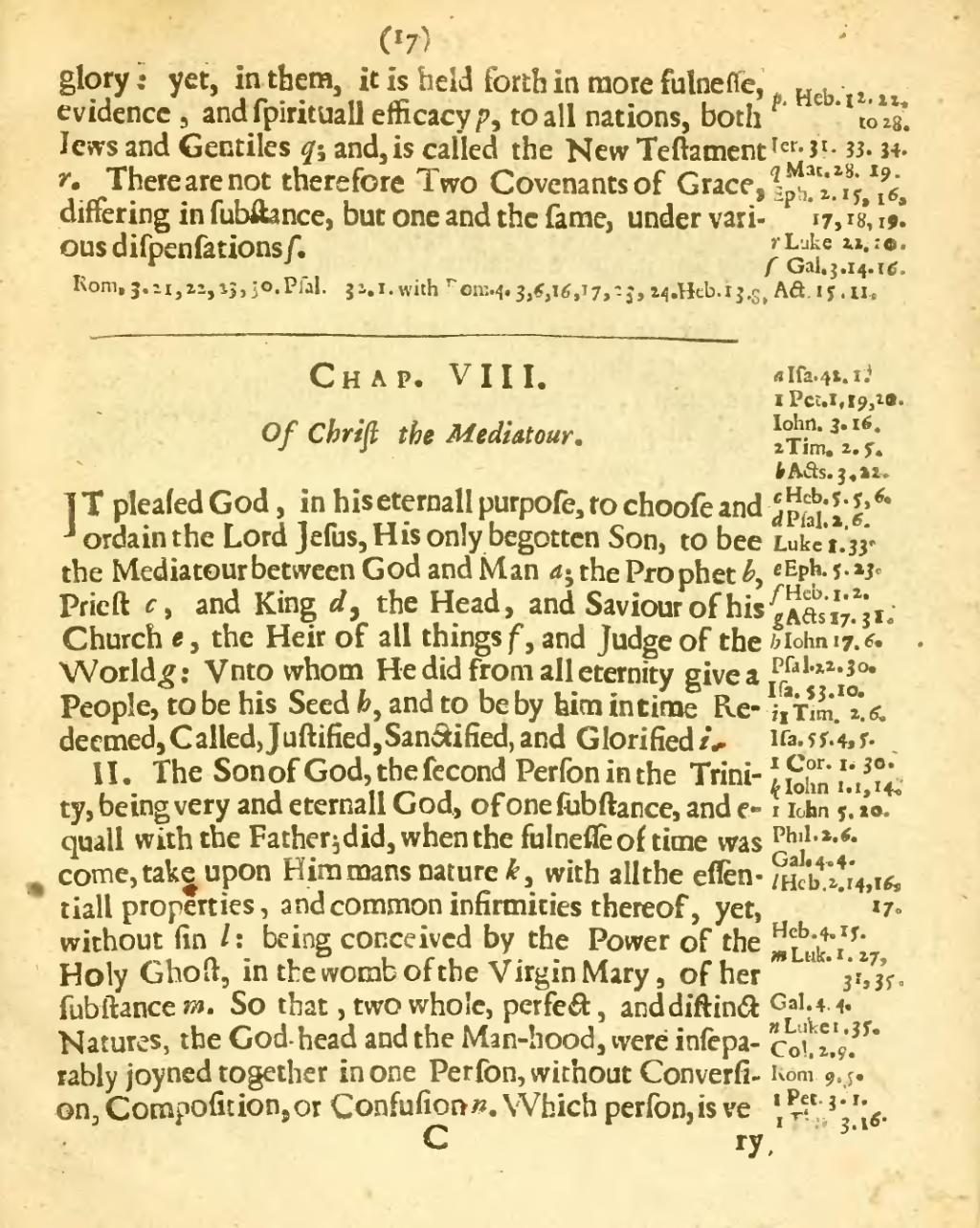(17)
glory: yet, in them, it is held forth in more fulneſſe, evidence, and ſpirituall efficacy[1], to all nations, both to Iews and Gentiles[2]; and, is called the New Teſtament[3]. There are not therefore Two Covenants of Grace, differing in ſubſtance, but one and the ſame, under various diſpenſations[4].
Chap. VIII.
Of Chriſt the Mediatour.
IT pleaſed God, in his eternall purpoſe, to chooſe and ordain the Lord Jeſus, His only begotten Son, to bee the Mediatour between God and Man[5]; the Prophet[6], Prieſt [7], and King[8], the Head, and Saviour of his Church[9], the Heir of all things[10], and Judge of the World[11]: Vnto whom He did from all eternity give a People, to be his Seed[12], and to be by him in time Redeemed, Called, Juſtified, Sanctified, and Glorified[13].
II. The Son of God, the ſecond Perſon in the Trinity, being very and eternall God, of one ſubſtance, and equall with the Father; did, when the fulneſse of time was come, take upon Him mans nature[14], with all the eſſentiall properties, and common infirmities thereof, yet, without ſin[15]: being conceived by the Power of the Holy Ghoſt, in the womb of the Virgin Mary, of her ſubſtance[16]. So that, two whole, perfect, and diſtinct Natures, the God-head and the Man-hood, were inſeparably joyned together in one Perſon, without Converſion, Compoſition, or Confuſion[17]. Which perſon, is ve-
- ↑ Heb. 12. 22. to 28.
Ier. 31. 33. 34 - ↑ Mat. 28. 19
Eph. 2. 15, 16, 17, 18, 19. - ↑ Luke 22. 20.
- ↑ Gal. 3. 14. 16
Rom, 2. 21, 22, 23, 30.
Pſal. 32. 1. with Rom. 4. 3, 6, 16, 17, 23, 24
Heb. 13. 8
Act. 15. 11. - ↑ Iſa. 42. 1
1 Pet. 1, 19, 20
Iohn. 3. 16.
2 Tim. 2. 5. - ↑ Acts. 3. 22.
- ↑ Heb. 5. 5, 6.
- ↑ Pſal. 2. 6.
Luke 1. 33. - ↑ Eph. 5. 23.
- ↑ Heb. 1. 2.
- ↑ Acts 17. 31.
- ↑ Iohn 17. 6.
Pſal. 22. 30.
Iſa. 53. 10. - ↑ 1 Tim. 2. 6.
Iſa. 55. 4, 5.
1 Cor. 1. 30. - ↑ Iohn 1. 1, 14.
1 Iohn 5. 20.
Phil. 2. 6.
Gal. 4. 4. - ↑ Heb. 2. 14, 16, 17.
Heb. 4. 15. - ↑ Luk. 1. 27, 31, 35.
Gal. 4. 4. - ↑ Luke 1. 35.
Col. 2. 9.
Rom 9. 5.
1 Pet. 3. 1.
1 Tim. 3. 16.

